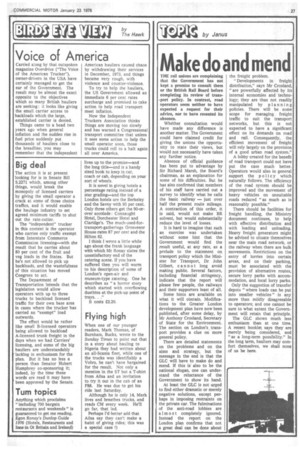Make do and mend
Page 29

If you've noticed an error in this article please click here to report it so we can fix it.
THE rail unions are complaining that the Government has not kept a promise to consult them or the British Rail Board before completing its review of trans.port policy. In contrast, road operators seem neither to have expected a request for their advice, nor to have resented its absence.
Whether consultation would have made any difference is another matter. The Government could have claimed credit for giving the unions the opportunity to state their views, but would not necessarily have taken any further notice.
Absence of official guidance has been put to advantage by Sir Richard Marsh, the Board's chairman, as an explanation for some of his difficulties. But he has also confirmed that members of his staff have carried out a survey to identify what he calls the basic railway — just over half the present route mileage. A contraction of this order, it is said, would not make BR solvent, but would substantially reduce the level of losses.
It is hard to imagine that such an exercise was undertaken without some hint that the Government would find the result useful, at any rate, as a prelude to the statement on transport policy which the Minister for Transport, Dr John Gilbert, cannot long avoid making public. Several factors, including financial stringency, indicate that the report will please few people, the railways and their supporters least of all.
Some hints are available on what it will contain. Modifications to the Greater London development plan have now been published, after some delay, by Mr Anthony Crosland, Secretary of State for the Environment. The section on London's, transport provides a clue on more general policy.
There are detailed statements on the problems and on the aims and strategy, but the message in the end is that the GLC will have to make do and mend. If this is` also to be the national slogan, one can understand the reluctance of the Government to show its hand.
At least the GLC is not urged to find either dramatic or merely negative solutions, except perhaps in imposing restraints on the private car. The fulminations of the anti-road lobbies are almost completely ignored. Instead the report on the London plan confirms that not a great deal can be done about the freight problem.
" Developments in freight distribution," says Mr Crosland, "are powerfully affected by its internal economies and technology; they are thus not readily manipulated by planning policies. There will be some scope for managing freight traffic to suit the transport networks, but this is not expected to have a significant effect on its demands on road and rail. Consequently, the efficient movement of freight will rely largely on the provision of a good urban road system."
A lobby created for the benefit of road transport could not have put the case much better. Operators would also in general support the policy which naturally follows. The efficiency of the road system should be improved and the movement of heavy vehicles on unsuitable roads reduced "as much as is reasonably possible."
There should be facilities for freight handling, the Ministry document continues, to help with effective distribution and with loading and unloading. Heavy freight generators might be advised to situate themselves near the main road network, or the railway when there are bulk movements. Restrictions on the entry of lorries into certain areas, and on their parking, must be associated with the provision of alternative routes, secure lorry parks with accommodation, and local lorry parks.
Only the suggestion of transfer depots "where loads can be put into smaller vehicles " is any more than mildly disagreeable to operators; and one cannot be sure to what extent the Government will retain that principle.
The GLC shows much less enthusiasm than at one time. A recent booklet says they are merely being considered, and "as a long-term possibility." In the long term, hauliers may comfort themselves, we shall none of us be here.
















































































